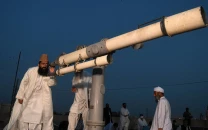‘No updated statistics on child labour’

‘No updated statistics on child labour’
Kashif Mirza, spokesperson SPARC, said nothing had been done on a government or private level to conduct a detailed survey in order to address the issue. The domestic employment of children, especially girls, is common in Pakistan. Parents, for whom money is a priority, bring their children to the city to work as domestic labourers.
Boys and girls, some even as young as seven, work unregulated hours with little or no time for recreation. They are at the risk of suffering from verbal, emotional, physical, and sometimes sexual abuse, according to SPARC. Mirza, talking to The Express Tribune, said, “The sincerity of the government towards combating child labour is evident from the fact that no survey on child labour has been carried out in over a decade.”
The last survey was conducted in 1996 and revealed that there were 3.3 million child labourers in Pakistan, out of which 2.4 million (73 per cent) were boys and 0.9 million (27 per cent) were girls. Male child labourers outnumbered female child labourers in both urban and rural areas, while child labour in rural areas was about eight times higher than in urban areas. This may be because of unpaid farm activities performed by family members in rural areas, the survey stated.
In Punjab, there were about 1.9 million child labourers, which was about 60 per cent of total child labour in the country. The Khyber-Pakhtunkhwa had about one million child labourers while the lowest figure was for Balochistan. Children were mostly employed in unskilled occupations like farms, sales and services, and craft related trades. The most common reasons given by parents or guardians for letting their child work were to supplement household income, pay outstanding debt, and assist or help in household enterprise.
Pakistan has signed and ratified the United Nations Convention on the Rights of the Child, making it mandatory for the state to provide children basic rights such as education, health, safety and security. Pakistan has also signed International Labour Organisation conventions which set the age limit for when children can start work. A specific law, Employment of Children Act (ECA) 1991, in Pakistan bans the labour of children under 14 in certain occupations. However, domestic child labour is not one of the banned occupations listed in the ECA.
Mirza said SPARC and other NGOs working for the rights of the child demanded of the government to take steps to implement the new Article 25-A in the 18th Constitutional Amendment which assures education for all children from 5 to 16 years of age. The government should include domestic child labour in the banned occupations of the ECA and strictly ban the employment of children as domestic help in homes Mirza said.
Raja Faizul Hasan Faiz, central labour adviser, Ministry of Labour and Manpower, talking to The Express Tribune, said domestic child labour is not equivalent to children working in a hazardous situation; therefore it is not a part of the child labour policy.



















COMMENTS
Comments are moderated and generally will be posted if they are on-topic and not abusive.
For more information, please see our Comments FAQ